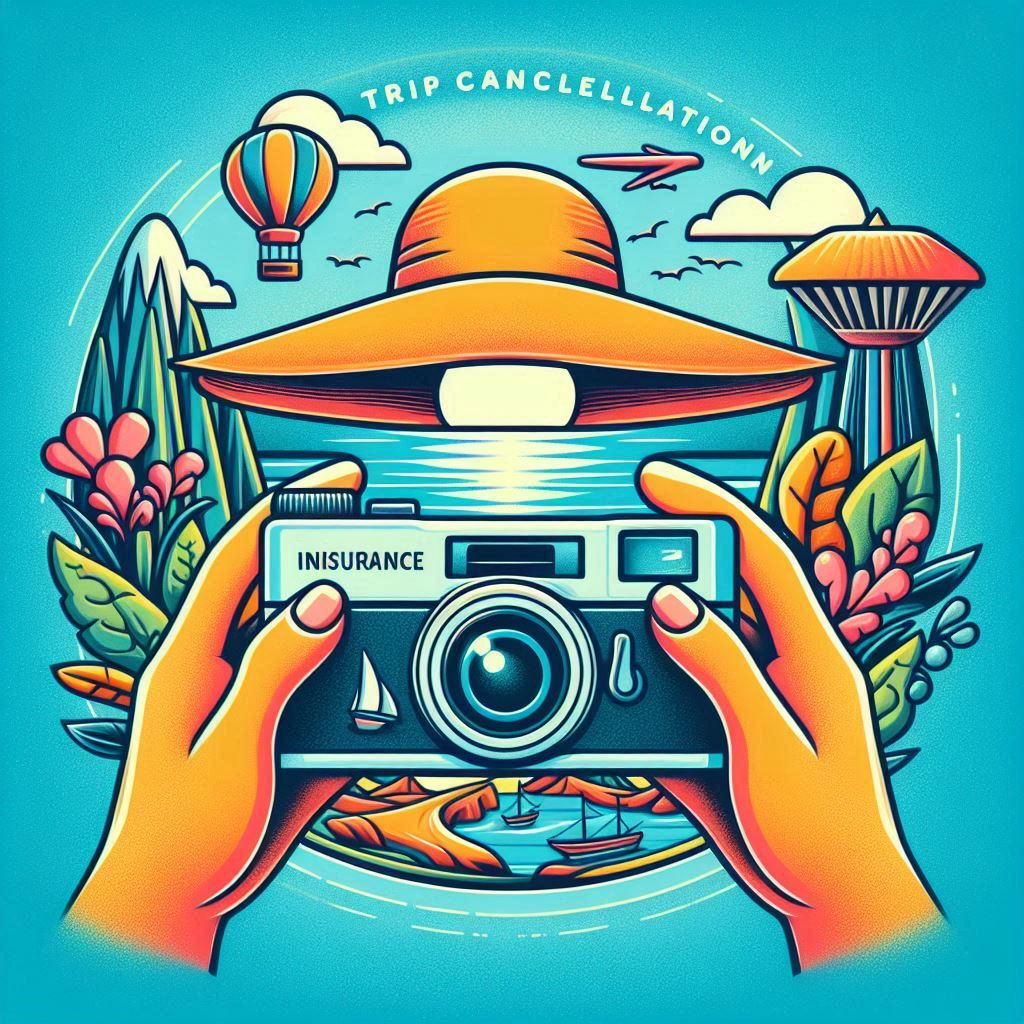Secure Your Plans with Trip Cancellation Insurance
Traveling is one of life’s greatest joys, but unexpected situations can turn your dream vacation into a financial nightmare. Whether it’s a last-minute illness, unforeseen weather, or travel provider issues, these hiccups can derail your plans. That’s where trip cancellation insurance becomes a lifesaver, ensuring that your travel investments remain protected. This guide will delve into everything you need to know about securing your peace of mind with this essential travel tool.
Understanding Trip Cancellation Insurance
What is Trip Cancellation Insurance?
Trip cancellation insurance is a specialized type of coverage designed to reimburse travelers for prepaid, non-refundable expenses when a trip is canceled due to covered reasons. This coverage can include flights, accommodations, tours, and even event tickets. Unlike regular travel insurance, which covers a broad spectrum of travel-related issues, this policy focuses exclusively on protecting your financial outlay if the unexpected prevents you from embarking on your journey.
For example, if you fall ill a day before departure, trip cancellation insurance can help you recover the money spent on your tickets and hotel bookings. It acts as a safety net, allowing you to plan trips with confidence.
How Does It Work?
The process of using trip cancellation insurance is straightforward. After purchasing a policy, travelers are covered for specific events outlined in their agreement. If one of these events occurs, you’ll need to provide evidence—such as a doctor’s note, proof of severe weather, or documentation of a travel provider’s bankruptcy—to file a claim.
Once the claim is submitted, the insurance company reviews the documentation. If everything checks out, the reimbursement process begins, typically covering expenses up to the insured amount.
Common Misconceptions About Trip Cancellation Insurance
Many travelers mistakenly believe that trip cancellation insurance covers every possible scenario. However, it’s essential to understand that policies have exclusions. For instance, canceling a trip because you “changed your mind” or found a better deal won’t qualify for a reimbursement unless you’ve purchased a Cancel for Any Reason (CFAR) add-on.
Another misconception is that this type of insurance is expensive. In reality, the cost is often a small fraction of your trip expenses—around 5-10%—making it a practical investment for safeguarding your plans.
Benefits of Trip Cancellation Insurance

Financial Security During Emergencies
Imagine you’ve paid thousands of dollars for a luxury cruise, only to discover an unavoidable emergency forces you to cancel. Without insurance, you’d likely lose all your non-refundable deposits. Trip cancellation insurance ensures your hard-earned money isn’t lost, reimbursing you for covered cancellations.
Peace of Mind While Traveling
Life is unpredictable, and planning for contingencies can be stressful. With trip cancellation insurance, you can focus on enjoying your trip rather than worrying about unforeseen mishaps. This peace of mind is especially invaluable during long-haul international trips, where unexpected costs can skyrocket.
Flexibility in Changing Plans
Flexibility is a significant benefit of having insurance. Whether you need to reschedule due to a work emergency or postpone because of sudden family obligations, trip cancellation insurance provides the cushion you need to adjust your plans without losing your investment.
Situations Covered by Trip Cancellation Insurance

Personal Emergencies (Illness, Injury, or Death)
This is one of the most common reasons for trip cancellations. Whether it’s a sudden illness, injury, or a family emergency, trip cancellation insurance steps in to cover the costs of unused bookings. Policies typically extend this coverage to immediate family members.
Natural Disasters or Weather-Related Events
Severe weather conditions like hurricanes, blizzards, or floods can make travel impossible. If such events affect your destination or departure, your insurance will cover the losses. This is particularly crucial for trips planned during storm seasons.
Travel Provider Issues (Bankruptcy, Strikes, etc.)
The travel industry isn’t immune to financial troubles. Airlines and tour operators sometimes go bankrupt, leaving travelers stranded. Similarly, strikes among transport workers can disrupt itineraries. Trip cancellation insurance ensures you’re not left footing the bill for these industry-related issues.
Global Health Crises (Pandemics)
The COVID-19 pandemic highlighted the importance of trip cancellation insurance. Many policies now include provisions for health crises, ensuring you can cancel trips without losing money if pandemics or other global health emergencies arise.
What is Not Covered?
Understanding Policy Exclusions
While trip cancellation insurance offers extensive coverage, it doesn’t protect against everything. Common exclusions include pre-existing medical conditions, reckless behavior, or cancellations made simply because you changed your mind. Knowing these exclusions upfront can prevent misunderstandings and disappointment.
Avoiding Misuse of Trip Cancellation Insurance
Using trip cancellation insurance responsibly is vital. Filing frivolous claims or attempting to falsify evidence can lead to denial and potentially affect your ability to secure insurance in the future. Always ensure your claims align with the policy terms.
How to Choose the Right Trip Cancellation Insurance
Key Features to Look For
When shopping for trip cancellation insurance, not all policies are created equal. Prioritize coverage that includes medical emergencies, severe weather, travel provider disruptions, and personal emergencies. Some policies even offer a “Cancel for Any Reason” (CFAR) option, which provides greater flexibility.
Additionally, ensure that your policy covers the total cost of your trip. This includes not only the main expenses like flights and hotels but also any non-refundable add-ons, such as excursions, tickets, or special events. Comprehensive coverage will leave no gaps in your protection.
Lastly, confirm that the policy includes 24/7 customer support. Emergencies don’t always happen during regular business hours, and immediate assistance can make all the difference when you’re in a tough spot.
Comparing Insurance Providers
Not all insurance providers are the same, and it’s crucial to compare them carefully. Start by researching established companies with strong reputations for reliability and customer service. Look at online reviews, ratings from insurance regulators, and feedback from travelers who’ve filed claims.
Pricing is another key consideration, but don’t choose the cheapest policy at the expense of comprehensive coverage. Instead, balance cost with the benefits offered. Finally, ask about the claims process—quick payouts and clear instructions are hallmarks of a dependable provider.
Importance of Reading the Fine Print
Skipping the fine print can lead to unpleasant surprises later. Carefully review your policy to understand what’s covered and, equally important, what’s not. Pay attention to exclusions, claim deadlines, and documentation requirements.
For instance, some policies might only reimburse cancellations made within a specific time frame, or they may require extensive proof. Knowing these details upfront will help you avoid headaches when filing a claim.
Cost of Trip Cancellation Insurance

Factors Influencing Premium Rates
The cost of trip cancellation insurance varies depending on several factors. These include the total cost of your trip, the length of travel, your age, and the level of coverage selected. For example, a traveler taking a short domestic trip may pay a lower premium than someone planning an extended international journey.
Additional factors, such as high-risk destinations or the inclusion of CFAR coverage, can also drive up costs. Always get a personalized quote to understand how these elements impact your premium.
Is It Worth the Cost?
While trip cancellation insurance might feel like an unnecessary expense, consider the financial consequences of going without it. Would you be comfortable losing hundreds—or even thousands—of dollars if an emergency arises?
For many travelers, the peace of mind alone is worth the investment. Plus, the relatively low cost (typically 5-10% of your trip’s total expenses) makes it an affordable safety net for both budget-conscious and luxury travelers.
Tips for Filing a Claim
Documentation Required
Proper documentation is crucial when filing a claim. You’ll need to provide proof of your trip expenses, such as receipts or invoices for flights, accommodations, and prepaid activities. Additionally, evidence of the cancellation reason is required—this might include a doctor’s note, police report, or weather advisories.
Organize all documents in advance to ensure a smooth claims process. Most insurance providers also offer digital submissions, making it easier to upload your paperwork.
Timely Submission of Claims
Timing is everything when it comes to claims. Many insurance policies have strict deadlines for filing, often within a few weeks of the cancellation event. Delays can result in denied claims, so act promptly.
As soon as you know your trip is canceled, contact your insurer to initiate the claims process. This proactive approach minimizes the risk of missing deadlines or overlooking important requirements.
Avoiding Common Mistakes When Filing Claims
Many claims are denied due to avoidable errors. Common pitfalls include providing incomplete documentation, failing to meet the policy’s conditions, or missing deadlines. To avoid these issues, carefully review the insurer’s requirements before submitting your claim.
If you’re unsure about any aspect of the process, reach out to the company’s customer support team. Clear communication can help resolve potential problems before they escalate.
Real-Life Scenarios Showcasing Importance
Case Study 1: A Missed Vacation Due to Illness
Imagine a traveler, Emily, who planned a once-in-a-lifetime European getaway. Days before her departure, she fell seriously ill and had to cancel. Without trip cancellation insurance, Emily would have lost over $5,000 in non-refundable expenses. Thankfully, her policy reimbursed her for flights, hotels, and tours, allowing her to reschedule without financial strain.
Case Study 2: Weather-Related Cancellations
John booked a tropical vacation during hurricane season, hoping for sunny skies. Unfortunately, a hurricane made landfall, forcing his airline to cancel all flights. His trip cancellation insurance not only refunded his prepaid expenses but also covered additional costs for rescheduling the trip.
Case Study 3: Trip Delays Due to Airline Bankruptcy
Samantha was all set for her honeymoon when her airline declared bankruptcy two days before departure. Without insurance, she would have been out of pocket for new flights. Fortunately, her policy covered the additional expenses, saving her from a financial disaster during what was meant to be a joyful occasion.
Frequently Asked Questions About Trip Cancellation Insurance
Is It Necessary for Every Trip?
Not necessarily. For short, inexpensive trips with minimal prepaid costs, you might skip it. However, for international travel, luxury vacations, or trips involving substantial non-refundable expenses, insurance is highly recommended.
Can I Buy Insurance After Booking My Trip?
Yes, but timing matters. Many insurers require you to purchase coverage within a set window after booking (e.g., 14-21 days). Buying early also ensures you can add CFAR coverage if needed.
What If I Cancel for Non-Covered Reasons?
Standard policies won’t reimburse you for cancellations outside the listed reasons. However, CFAR coverage allows you to cancel for any reason, typically reimbursing 50-75% of your costs. This option is pricier but offers unmatched flexibility.
Conclusion
Trip cancellation insurance is a travel essential that protects your investment, offers peace of mind, and provides flexibility in uncertain times. From covering unexpected emergencies to navigating the complexities of filing a claim, it ensures your travel plans stay secure, no matter what comes your way.
FAQs
1. What’s the difference between travel insurance and trip cancellation insurance?
Travel insurance covers a broader range of issues, including medical emergencies and lost baggage, while trip cancellation insurance focuses specifically on refunding costs for canceled trips.
2. Can I purchase trip cancellation insurance after my trip has started?
No, it must be purchased before the trip begins, and often within a specific timeframe after booking.
3. Are pandemics always covered under trip cancellation insurance?
Not all policies cover pandemics. Look for plans that explicitly include provisions for global health crises.
4. Does CFAR coverage include 100% reimbursement?
No, CFAR typically covers 50-75% of your costs, but it offers unmatched flexibility compared to standard policies.
5. Is trip cancellation insurance worth it for budget travelers?
Yes! Even budget travelers can benefit, especially if the trip involves non-refundable expenses like low-cost airline tickets or prepaid accommodations.
